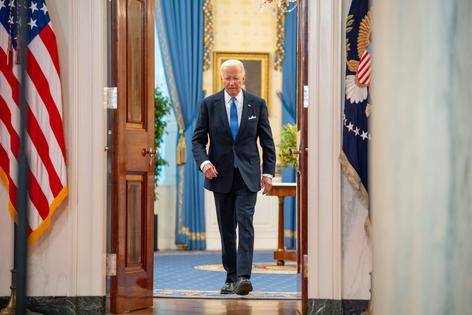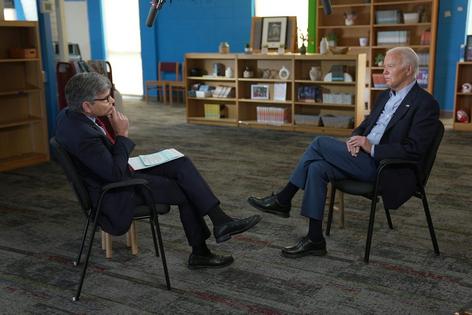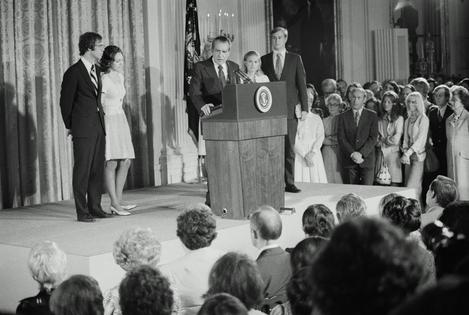Joe Biden commits to staying in the race – like Nixon, his biggest threat comes from within his own party
Published in Political News
President Joe Biden is strongly reaffirming his commitment to stay in the presidential race – despite a growing number of calls from politicians and voters for him to step down, following a highly criticized debate performance in June 2024.
After Biden said in an ABC news interview that only “the Lord Almighty” could convince him to drop out, he wrote a letter on July 8 to congressional Democrats declaring that “I am firmly committed to staying in this race, to running this race to the end, and to beating Donald Trump.”
This comes as additional prominent Democratic politicians are reportedly – and mostly privately – calling for Biden to exit the race.
Biden has been consistent in saying he’s staying in the race, but that doesn’t necessarily tell the whole story. The Conversation U.S.‘ Politics and Society Editor Amy Lieberman spoke with Philip Klinkner, a scholar of American politics and the presidency at Hamilton College, to better understand what factors might influence what Biden says and his ultimate decision to stay in the race or not.
Can we take Biden’s words about staying in the race at face value? Do they reflect what’s happening behind the scenes?
Biden obviously knows that his support among Democrats – mostly elected Democrats in Congress, governors and others – is slipping. He knows that if he shows signs of indecision, that could lead to less support from Democrat politicians, which would cause even more waffling. He is trying to present a brave front as a way to kind of stem any defections, doubts and bleeding. So far, that hasn’t really had the intended effect.
Each day we see a trickle of Democrats in Congress who have called for Biden to step aside. Biden’s approach may have kept this trickle from becoming a deluge, but it could become a deluge at any time.
What factors are these politicians considering as they decide whether to back Biden or not?
There is a range of considerations. One argument is that Biden is obviously flawed, but is there anyone out there who would be a better nominee against Trump? Another factor is that Biden has been a Washington, D.C. fixture for decades. Many of these people are friends with him and have worked with him. They don’t necessarily want to be the friend who turns on him in the end.
The other factor is that if Biden is not going anywhere, these politicians don’t want to be the one who calls for him to leave. Then, Biden and the folks who work around him could later say, “You abandoned me when I needed you most.”
Have we seen politicians previously who emphatically committed to staying in a race before they abruptly changed their minds?
Politicians are always fully committed to some course of action until they are not, and they often express this in the most absolute terms.
In 1972, Democratic presidential candidate George McGovern selected Thomas Eagleton as his vice president running mate. News then came out that Eagleton had been treated for depression and had electroconvulsive therapy. At the time, attitudes toward mental illness were not as accepting as they are today, and McGovern and Eagleton faced a lot of criticism. McGovern first said he was behind Eagleton “1,000%,” and then a few days later he cut him loose and dropped him from the ticket.
Until a day or two before Richard Nixon resigned as president in August 1974, he said he would never do it. For more than a year, people were calling on Nixon to resign following the Watergate scandal, in which Nixon operatives were caught trying to bug the Democratic National Committee headquarters. These calls amplified after the Saturday Night Massacre in October 1973, when he fired a special prosecutor and accepted the resignations of the two top officials in the Department of Justice – the attorney general and deputy attorney general – who were involved with investigating Watergate.
What was the critical moment in these two cases?
In Nixon’s case – and as Biden could be be facing now – the support of his own party collapsed. Top congressional Republicans went to the White House and said, “Look, you will be impeached if you don’t step down.” Nixon famously asked Senator Barry Goldwater about what his support in the Senate looked like. Goldwater said, “There’s not more than 15 senators for you.”
With Eagleton and McGovern, the lack of support from within their party was also a key factor that led to the switch in vice presidential candidate.
In Biden’s case, I think that having senior Democrats like Congressman Jerry Nadler saying, even in private calls, that he should step down will lead to him quitting the race. Biden can only handle so much of that because the more that goes on, the more it gives room and safety for other Democrats to come out.
Is there more going on behind the scenes that’s convinced Biden and his allies that he should stay in the race?
There has been some exaggeration in how bad Biden’s poll numbers actually are. Yes, Biden has dipped in the polls, but it has not been a free fall and it is still a very close race. Historically, what we tend to see is that if a politician takes a hit in the polls because of a particular incident, it tends to be pretty short-lived. What the Biden people are likely thinking is, 'Yes, we took a hit in the polls after the debate, but if you give it two weeks, the race will return to where it was before the debate.’
When Trump got convicted on 34 felony counts in May 2024, that just barely moved the poll numbers. People may not be happy with the choice of Trump versus Biden, but most people know who they are going to pick in that circumstance.
Most people running for office are pretty immune to attacks from the other party. What hurts the most is when people in your own party start to criticize you.
That is what is happening here with Biden. The Biden people are saying that if everyone just got on board, we would not see any dip in the polls.
This article is republished from The Conversation, a nonprofit, independent news organization bringing you facts and analysis to help you make sense of our complex world.
Read more:
2024 is not 1968 − and the Democratic convention in Chicago will play out very differently than in the days of Walter Cronkite
One memorable speech can turn around a faltering campaign − how Nixon did it with his ‘Checkers’ talk
Philip Klinkner does not work for, consult, own shares in or receive funding from any company or organization that would benefit from this article, and has disclosed no relevant affiliations beyond their academic appointment.




























































Comments